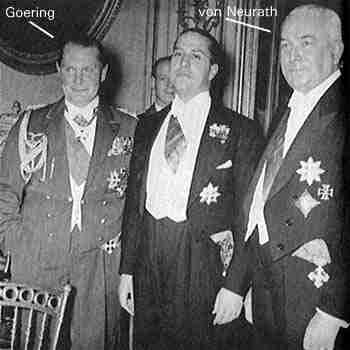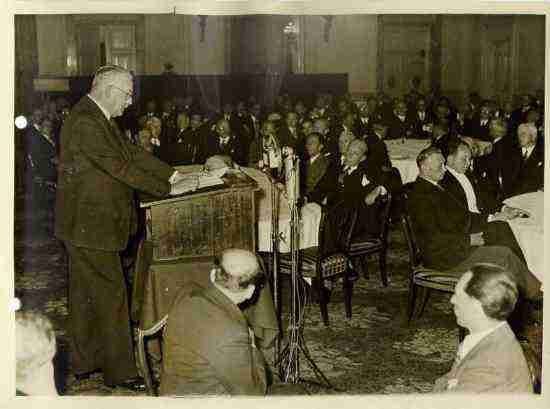Goering: Von Neurath

Professor Doctor Herbert Kraus (Counsel for Defendant Hjalmar Schacht): Professor Kraus for Dr. Ludinghausen on behalf of the Defendant [Constantin] von Neurath. I ask your permission to put several questions to the witness. Witness, at the Munich conferences Hitler, it is alleged, put the following question: "What is to happen if the Czechs are not in agreement with our occupation of the Sudetenland?" Thereupon Daladier answered, "Then we will force them." Is that correct?
Goering: This question was actually broached by the Fuehrer during the discussion. Premier Daladier said, in substance, whether with the same words or not, something which corresponds to the sense of this statement. As far as I can still remember fairly exactly, he emphasized that now a decision in that direction had been reached by the great powers for the purpose of maintaining peace, and this peace must not be threatened anew by Czechoslovakia's refusal, otherwise neither England nor France would feel themselves in any way in duty bound to help, if Czechoslovakia did not follow this advice.
Dr Kraus: Witness, how long have you known Herr von Neurath?
Goering: As far as I recall I saw Herr von Neurath very briefly when he was the German Ambassador to Denmark in 1919, but only for a short time. Later I met him again just before the seizure of power and spoke to him very briefly, I believe; my closer relationship and acquaintance begins from the time after the seizure of power.
Dr Kraus: Did you have any closer knowledge of his activities as Ambassador in London?
Goering: That is correct. I did know about his work before, because even in former times, that is in 1931 and 1932, before Herr von Neurath became Foreign Minister, in discussions about the possible formation of a cabinet, we also considered the name of Herr von Neurath as a candidate, even though he did not belong to the Party. As a basic consideration in this connection his very position as Ambassador to England played the main role, since we, that is, Hitler as well as I, were of the opinion that Herr von Neurath's relations as Ambassador to the English Government were very good and that Herr von Neurath could be an important factor in this field--that of good relations with England--which was a basic consideration in the Fuehrer's foreign policy.
Dr Kraus: Then I may assume that Herr von Neurath had pursued a policy of peace and understanding in London?
Goering: Yes, you can assume that exactly.
Dr Kraus: Yes; and can you tell me if, beyond that, Herr von Neurath made efforts in his capacity as Foreign Minister as well, to continue this policy of peace and understanding?
Goering: When Reich President von Hindenburg made it a condition, which I have already mentioned, that Herr von Neurath should become Foreign Minister, the Fuehrer was in full agreement with this condition, because he saw that the task of establishing good relations with England and the West was in good hands. Herr von Neurath always made every effort in this direction.
Dr Kraus: I should like to deal with another series of questions. Were you present at the meeting of the Reich Cabinet on 30 January 1937, during which Hitler gave the Golden Party Emblem to those members of the Cabinet who were not members of the Party, among them also Herr von Neurath?
Goering: Yes, I was present.
Dr Kraus: And do you know that Hitler declared on this occasion that it was purely a distinction such as the conferring of an order, and that the gentlemen concerned did not thereby become Party members and had no obligations toward the Party?
Goering: I would not put it just that way. The Fuehrer was speaking spontaneously, since it was the anniversary of the seizure of power, and he said it was his intention in this way to show his confidence in those members of the Reich Cabinet who did not belong to the Party. I believe he used the words, "I should like to ask them to accept this Party Emblem." He said at the time that in his opinion this was a decoration and that he intended, as he actually did later, to develop additional grades of this decoration. The first grade of this decoration was to be the Golden Party Emblem. Then, on the spur of the moment, he stepped up to the various ministers and handed them this emblem. In doing so he neither emphasized that they were thereby to consider themselves members of the Party, nor did he emphasize that they were not Party members.

The Fuehrer had told me this previously and, as he had left it to me to tell von Eltz about it gradually, in a diplomatic way, I took this opportunity and went to Herr von Eltz and said: "Your behavior was impossible, and I think the only thing for you to do is to resign at once." He said, "I did not mean it like that," and he was not willing to hand in his resignation right away. I then asked him abruptly to do so by that evening. I also sent State Secretary Meissner to him to say it would be advisable for him to leave the Cabinet, and hand in his resignation immediately, especially in view of--and then I gave the explanations concerning the post and railroads as I have just given them. That was what happened at that conference with regard to the Golden Party Emblem.
Dr Kraus: Witness, were you present when Hitler, in the evening of 11 March 1938, told Herr von Neurath in the Reich Chancellery about the entry of the troops into Austria, and informed him of the reasons for this move, and asked him to inform the Foreign Office accordingly, because he himself had to leave?

Dr Kraus: Then one is to conclude that Herr von Neurath was not the deputy of the Foreign Minister but only in his absence was to serve as sort of an adviser to you?
Goering: He was not the deputy of the Foreign Minister; that would not at all have been in keeping with his position and his rank. The deputy of the Foreign Minister was the acting State Secretary.
Dr Kraus: Von Weizsacker?
Goering: I believe it was Herr von Mackensen at that time; he also signed the current correspondence in the absence of the Foreign Minister. Herr von Neurath was only my adviser in such matters of foreign policy as were expected to come up in connection with the Austrian case.
Dr Kraus: Do you know of the protest which came from the British Ambassador on 11 March 1938, which was addressed, strangely enough, to Herr von Neurath and in which the British Ambassador protested against the marching in of German troops?
Goering: That is not at all so strange, for on the evening of the marching in of the troops I personally, as I have explained, spoke to the British Ambassador for 2 hours and told him that the Fuehrer was going to Austria the next day; that I would administer the Reich and had for this purpose requested Herr von Neurath as my foreign political adviser, as Sir Neville Henderson had already hinted that this would not be tolerated without protests. Thus the British Ambassador had already received this information from me the evening before. This explains the fact that he turned to Herr von Neurath, because I had said to him, "If you come around with your old notes of protest, I personally cannot do very much about them."
Dr Kraus: Did Herr von Neurath, after the Foreign Minister had formulated the answer to the protest, notify you by telephone of that answer, and did he ask you whether you would sign it as Hitler's deputy?
Goering: Yes, of course; I was deputy head of State. He had to inform me of the reply and it was also a matter of course that I should say to him, "You sign," for as deputy head of State I could not sign diplomatic notes.






The Nuremberg Tribunal Biographies
Caution: As always, these excerpts from trial testimony should not necessarily be mistaken for fact. It should be kept in mind that they are the sometimes-desperate statements of hard-pressed defendants seeking to avoid culpability and shift responsibility from charges that, should they be found guilty, can possibly be punishable by death.
Disclaimer:The Propagander!™ includes diverse and controversial materials--such as excerpts from the writings of racists and anti-Semites--so that its readers can learn the nature and extent of hate and anti-Semitic discourse. It is our sincere belief that only the informed citizen can prevail over the ignorance of Racialist "thought." Far from approving these writings, The Propagander!™ condemns racism in all of its forms and manifestations.
Source Note: The trial portion of this material, which is available in its entirety at the outstanding Avalon and Nizkor sites, is being presented here in a catagorized form for ease of study and is not meant to supplant or replace these highly recommended sources.
Fair Use Notice: This site--The Propagander!™--may contain copyrighted material the use of which has not always been specifically authorized by the copyright owner. We are making such material available in our efforts to advance understanding of historical, political, human rights, economic, democracy, scientific, environmental, and social justice issues, etc. We believe this constitutes a "fair use" of any such copyrighted material as provided for in section 107 of the US Copyright Law. In accordance with Title 17 U.S.C. Section 107, the material on this site is distributed without profit to those who have expressed a prior interest in receiving the included information for research and educational purposes. If you wish to use copyrighted material from this site for purposes of your own that go beyond 'fair use', you must obtain permission from the copyright owner.

